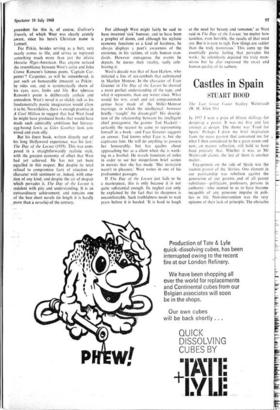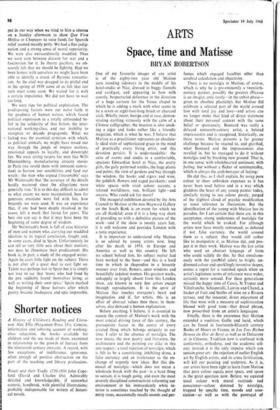Castles in Spain
STUART HOOD
In 1937 1 won a prize of fifteen shillings for designing a poster. It was my first and last attempt at design. The theme was 'Food for Spain.' Perhaps I drew my brief inspiration from the naive passion that consumed me for what I then considered to be a great cause and now, on mature reflection, still hold to have been precisely that. Whether it was, as Mr Weintraub claims, the last of them is another matter.
Engagement on the side of Spain was the student protest of the 'thirties. One element in our partisanship was rebellion against the generation of our parents and of all parent substitutes—politicians, professors, persons in authority—who seemed to us to have become incapable of any generous impulse in poli- tics or life. Non-intervention was the very epitome of their lack of principle. The obstacles put in our way when we tried to hire a cinema on a Sunday afternoon to show Que Viva Wilco or Chapayev to raise funds for Spanish relief seemed meanly petty. We had a fine indig- nation and a strong sense of moral superiority. We were also extraordinarily muddled. Thus we were torn between distaste for war and a fascination for it. In theory pacifists, we ob- scurely felt that we should be fighting. Had we been honest with ourselves we might have been able to identify a streak of Byronic romantic- ism. As the civil war dragged to its pitiful end in the spring of 1939 some of us felt that our turn must come soon. We waited for it with a certain impatience. We did not have to wait too long.
We were ripe for political exploitation. The predisposing factors were our naïve faith in the goodness of human nature, which found political expression in a totally unfounded be- lief in the solidarity of that fiction, the inter- national working-class, and our inability to recognise or decode propaganda. What we lacked was the essential cynicism with which, as political animals, we might have nosed our way through the jungle of impure motives, emotional appeals to loyalty, and downright lies. We were sitting targets for men like Willi Muenzenberg, manufacturing atrocity stories in Paris (we retold them with innocent convic- tion) to harrow our sensibilities and feed our wrath: the man who argued (`reasonably' says Mr Weintraub) that 'the accuracy of the details hardly mattered since the allegations were generally true.' It is to this day difficult to admit to what extent we were manipulated, how far generous emotions were fed with lies, how brazenly we were used. It was an experience that, if one had been deeply involved in the cause, left a mark that lasted for years. The best one can say is that it may have been the beginning of some degree of wisdom.
Mr Weintraub's book is full of case histories of men and women who, carrying our muddled idealism to its logical conclusion, fought and, in some cases, died in Spain. Unfortunately he can tell us very little new about their motives; nor does he illuminate their predicament. His book is, in part, a study of the engaged writer. Again he casts little light on the subject. There is not after all a great deal to cast light on. Talent was perhaps lost in Spain but it is simply not true to say that 'many who had lived by the pen suddenly found themselves living, as well as writing their own epics.' Spain marked the beginning of those horrors after which poetry became inadequate and epic impossible.







































 Previous page
Previous page